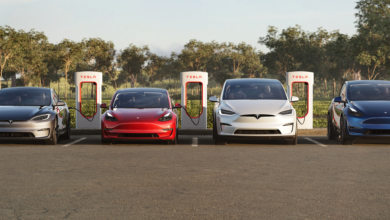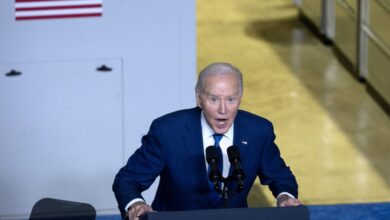Tesla will shed more than 10 percent of its workforce

In a separate layoff notice obtained by The Washington Post, employees were told early Monday morning that Tesla was cutting a significant number of jobs globally after a “thorough review of the organization.”
“Over the years, we have grown rapidly with multiple factories scaling around the globe,” according to the email, which was shared with The Post. “With this rapid growth, there has been duplication of roles and job functions in certain areas. As we prepare the company for our next phase of growth, it is extremely important to look at every aspect of the company for cost reductions and increasing productivity.”
In its layoff notice to employees, signed “Tesla,” workers were told Monday was their last working day and their access to Tesla’s systems and locations was being cut off immediately. Workers were told they would receive information on severance packages and benefits within 48 hours.
One laid off worker, speaking on the condition of anonymity to discuss a sensitive matter, said the news of job cuts came as a shock at his location, where multiple employees lost their jobs.
The latest development comes after Tesla, which employed more than 140,000 as of December, reported a sharp decline in vehicle deliveries in the first quarter. It’s also been grappling with a string of lawsuits related to its Autopilot technology and controversy surrounding Musk. Its stock has shed a third of its value this year and was trading down 2.6 percent by midday Monday.
“As we prepare the company for our next phase of growth, it is extremely important to look at every aspect of the company for cost reductions and increasing productivity,” Musk said. “As part of this effort, we have done a thorough review of the organization and made the difficult decision to reduce our head count by more than 10% globally.”
While sales of electric vehicles are still growing faster than gasoline car sales in the United States, interest has started to cool amid concerns about a lack of charging infrastructure, among other reasons. Other automakers, including General Motors, Ford and Mercedes-Benz, have delayed electrification goals or reduced their short-term ambitions of electrification.
Big EV producers in China, including BYD, have also ramped up exports, challenging Tesla and other Western automakers for global market share.
Monday’s announcement also coincides with the departure of Drew Baglino, Tesla’s senior vice president for powertrain and energy, who on Monday announced on X that he’s made the “difficult decision” to leave Tesla after working there for 18 years. Musk replied to say: “few have contributed as much as you” at Tesla.
Rohan Patel, a former Obama administration official who led policy and business development at Tesla for eight years, also announced his resignation Monday, which also prompted thanks on X from Musk.
Tesla did not respond to a request for comment Monday.
Earlier this month, Tesla disclosed that sales had fallen faster than expected amid waning demand for electric vehicles. Deliveries tumbled to 387,000 in the first quarter, a 20 percent falloff from the previous quarter and an 8 percent drop year over year. The company blamed the slowdown, at least in part, on a shift to early production of the next version of its Model 3 sedan, Red Sea shipping disruptions and suspected arson at its Berlin factory.
Musk said the company was “between two major growth waves” as it pivots resources toward the production of its next vehicle.
Analysts said the deep job cuts announced Monday indicate any recovery is at least a year away, with the company in cost-cutting mode.
“They’re clearly adjusting the business for this remarkable slowdown in demand,” said Gene Munster, managing partner at Deepwater Asset Management, who added that new phase of growth for the company probably will not start until 2025. Customers should also expect longer lead times as Musk may be “over-cutting,” he said.
“If there were some massive rebound in the business, they wouldn’t be doing layoffs,” Munster said.
Tesla also is facing increased scrutiny from regulators over its driver-assistance software Autopilot. Last year, the company agreed to recall 2 million vehicles — nearly every car it has produced — over concerns that the technology did not have enough guardrails to prevent driver misuse. The recall was the result of a sweeping investigation by the National Highway Traffic Safety Administration.
The company’s Autopilot technology has been linked to more than 700 crashes since 2019 and at least 19 fatalities, according to a Washington Post analysis of NHTSA data.
Tesla’s legal position is that it repeatedly and explicitly warns drivers that they are ultimately in control of the vehicle, must be fully alert and have hands on the wheel while using Autopilot. But last week, court documents show, it agreed to settle a lawsuit stemming from the 2018 death of a former Apple engineer whose vehicle veered off a California highway. The case is among several alleging that Autopilot contributed to a fatal crash. Last fall, the company was deemed not liable in a lawsuit involving the technology and a 2019 crash in Riverside County, Calif. Two other cases heading to trial later this year.
Meanwhile, a survey by the market intelligence firm Caliber, provided to Reuters, showed that Tesla’s “consideration score” was down to 31 percent in February. That compares with the 70 percent recorded in November 2021, when it started tracking consumer interest in the brand. The report said Musk’s reputation was partly to blame; he has courted controversy in the past year with polarizing comments that have driven away users and advertisers from X, formerly Twitter, which he owns.
The company’s not-yet-released vehicles include a robotic taxi, details of which are to be unveiled in early August. “We are developing some of the most revolutionary technologies in auto, energy and artificial intelligence,” Musk said in the note published by CNBC. “As we prepare the company for the next phase of growth, your resolve will make a huge difference in getting us there.”
Jeanne Whalen and Trisha Thadani contributed to this report.



